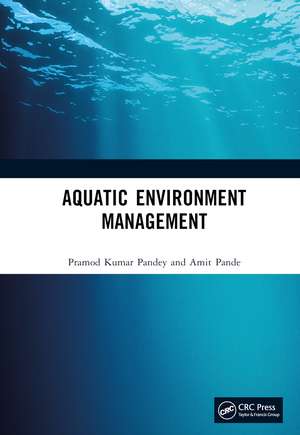Aquatic Environment Management
Autor Pramod Kumar Pandey, Amit Pandeen Limba Engleză Hardback – 30 noi 2023
Key features
- Covers different types of aquatic ecosystems like wetlands, rivers, lakes, saline, and brackish
- Reviews the latest applications of remote sensing in the monitoring and assessment of aquatic ecosystems
- Includes traditional methods like cartography, sampling, surveying, phytoplankton assessment and chlorophyll estimation
- Discusses the application of artificial intelligence, machine learning, data fusion in monitoring aquatic systems
- Explores the prospects of future Earth observation space missions for aquatic ecosystem monitoring
Preț: 842.26 lei
Preț vechi: 1027.14 lei
-18% Nou
Puncte Express: 1263
Preț estimativ în valută:
161.22€ • 175.18$ • 135.51£
161.22€ • 175.18$ • 135.51£
Carte tipărită la comandă
Livrare economică 21 aprilie-05 mai
Preluare comenzi: 021 569.72.76
Specificații
ISBN-13: 9781032321585
ISBN-10: 103232158X
Pagini: 242
Ilustrații: 33 Line drawings, black and white; 33 Illustrations, black and white
Dimensiuni: 178 x 254 x 14 mm
Greutate: 0.61 kg
Ediția:1
Editura: CRC Press
Colecția CRC Press
ISBN-10: 103232158X
Pagini: 242
Ilustrații: 33 Line drawings, black and white; 33 Illustrations, black and white
Dimensiuni: 178 x 254 x 14 mm
Greutate: 0.61 kg
Ediția:1
Editura: CRC Press
Colecția CRC Press
Public țintă
Academic, Postgraduate, and Professional ReferenceCuprins
Chapter 1. Ecology of aquatic ecosystem
Chapter 2. Physicochemical properties of water and their significance for aquatic life
Chapter 3. Nutrient cycling in aquatic ecosystem
Chapter 4. Primary production in aquatic environments
Chapter 5. Benthic communities of the aquatic environment
Chapter 6. Eutrophication in aquatic ecosystem
Chapter 7. Aquatic pollution and its impact
Chapter 8. Aquatic environment management with reference to climate change
Chapter 9. Wastewater management
Chapter 10. Environmental biotechnology
Chapter 11. Information technology in the management of the aquatic environment
Chapter 12. Aquatic toxicology
Chapter 13. Integrated coastal zone management (ICZM)
Chapter 14. Environmental regulations and conventions
Chapter 15. Environmental impact assessment
Chapter 16. Environmental ecolabelling
Chapter 17. Environmental auditing
Chapter 18. Environmental economics
Index
Chapter 2. Physicochemical properties of water and their significance for aquatic life
Chapter 3. Nutrient cycling in aquatic ecosystem
Chapter 4. Primary production in aquatic environments
Chapter 5. Benthic communities of the aquatic environment
Chapter 6. Eutrophication in aquatic ecosystem
Chapter 7. Aquatic pollution and its impact
Chapter 8. Aquatic environment management with reference to climate change
Chapter 9. Wastewater management
Chapter 10. Environmental biotechnology
Chapter 11. Information technology in the management of the aquatic environment
Chapter 12. Aquatic toxicology
Chapter 13. Integrated coastal zone management (ICZM)
Chapter 14. Environmental regulations and conventions
Chapter 15. Environmental impact assessment
Chapter 16. Environmental ecolabelling
Chapter 17. Environmental auditing
Chapter 18. Environmental economics
Index
Notă biografică
Dr. Pramod Kumar Pandey is the Director of ICAR-Directorate of Coldwater Fisheries Research, Bhimtal, India. He has more than 33-years of experience in the field of fisheries and aquaculture. He started his professional career at Marine Products Export Development Authority, Kochi in 1988. He joined the Agricultural Research Service as a scientist in 1993 and worked at different positions in ICAR—as a scientist, senior scientist, and principal scientist at ICAR-Central Institute of Fisheries Education, Mumbai. After serving as Dean, College of Fisheries, Central Agricultural University (Imphal) for more than five years, he became Director of ICAR-DCFR, Bhimtal in May 2021. Dr. Pandey has received many national and international awards from different organisations. His more than 150 publications include seven books and research papers in national and international journals as well as from his many institutional and externally-funded research projects. He has conducted trainings, workshops, and seminars for farmers, students, and fisheries officials. His most significant achievement has been the voluntary breeding of magur in captivity. He has also guided around 30 students for their post graduate and PhD programmes.
Dr. Amit Pande is a principal scientist at ICAR-Directorate of Coldwater Fisheries Research, Bhimtal. He has more than 24-years of research experience in biotechnology. He started his career as a scientist in the Agricultural Research Service in 1997 and worked in the Indian Veterinary Research Institute, Izatnagar, Bhopal, and Mukteshwar campuses. He was awarded a Commonwealth Scholarship by the Foreign and Commonwealth Office, United Kingdom, and received his PhD from the University of Reading. He joined ICAR-Directorate of Coldwater Fisheries Research, Bhimtal as a senior scientist (biotechnology) in 2007 and has more than 14-years of experience in fish biotechnology. He served as ICAR-National Fellow from 2014 to 2019. He has completed several institutional and externally-funded projects besides being involved in training and guiding students in the master’s and PhD programmes.
Dr. Amit Pande is a principal scientist at ICAR-Directorate of Coldwater Fisheries Research, Bhimtal. He has more than 24-years of research experience in biotechnology. He started his career as a scientist in the Agricultural Research Service in 1997 and worked in the Indian Veterinary Research Institute, Izatnagar, Bhopal, and Mukteshwar campuses. He was awarded a Commonwealth Scholarship by the Foreign and Commonwealth Office, United Kingdom, and received his PhD from the University of Reading. He joined ICAR-Directorate of Coldwater Fisheries Research, Bhimtal as a senior scientist (biotechnology) in 2007 and has more than 14-years of experience in fish biotechnology. He served as ICAR-National Fellow from 2014 to 2019. He has completed several institutional and externally-funded projects besides being involved in training and guiding students in the master’s and PhD programmes.
Descriere
This reference book collates traditional and modern applications of remote sensing in aquatic ecosystem monitoring. It covers conventional assessment methods like sampling, surveying, and chlorophyll estimation. The book is meant for scientists, professionals, and policymakers working in environmental sciences, remote sensing, and geology.
